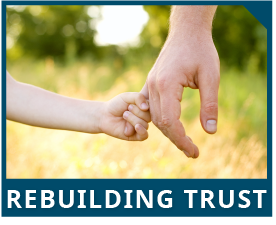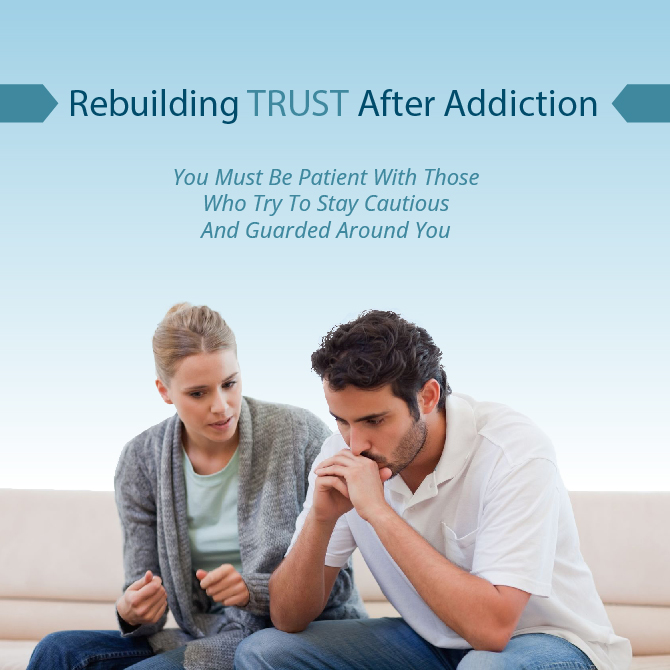When you are addicted to drugs or alcohol, if affects more than just you; it spreads through all of your relationships, whether in the work place, with your friends, in your family, or with your significant other. Addiction can cause you to lie to those you care about, let them down, steal from, disappoint, and a whole host of other negative actions that can corrode any bond you had. Thus, once you decide to take responsibility for your actions and make an effort to get clean, rebuilding trust is a major step towards full recovery.
 Depending on how long and severe your addiction has been and how you’ve handled your relationships, there may be some varying steps in repairing your friendships, bonds, and trust with others. During your addiction, you can cause all sorts of negative emotions to surface: anger, fear, disappointment, worry, distrust, and now you must take the steps to repair and replace all of them.
Depending on how long and severe your addiction has been and how you’ve handled your relationships, there may be some varying steps in repairing your friendships, bonds, and trust with others. During your addiction, you can cause all sorts of negative emotions to surface: anger, fear, disappointment, worry, distrust, and now you must take the steps to repair and replace all of them.
I’ve Finished Rehab; What Next?
To begin with, getting help at a rehab center, undergoing detoxification and counseling, is a great first step to prove that you are serious about not only improving your quality of life, but the quality of life for those around you as well. By starting on the road to clean living, you will no longer be jeopardizing those around you by asking for (or stealing) money to feed your addiction, putting them in risky situations (being around dangerous places or people), causing them to worry about you (when you break the law or hurt yourself), or being a detrimental influence to your family and friends. Instead, you will be proving to them that you wish to change, grow, and evolve, that you are willing to do what it takes to live without your addiction.
 However, this alone is not enough. Many addicts have attempted rehab before, just to relapse later down the road. If this is the case, what’s going to make your loved one believe that things will be different this time around? Maybe you hid and lied about that relapse due to shame and they found out that you were lying? Maybe you begged for their forgiveness, promised to never do it again, only to fall short down the road once more? Either way, addiction recovery is a steep path and previous failures can make it a hard sell to convince them that this time you are serious.
However, this alone is not enough. Many addicts have attempted rehab before, just to relapse later down the road. If this is the case, what’s going to make your loved one believe that things will be different this time around? Maybe you hid and lied about that relapse due to shame and they found out that you were lying? Maybe you begged for their forgiveness, promised to never do it again, only to fall short down the road once more? Either way, addiction recovery is a steep path and previous failures can make it a hard sell to convince them that this time you are serious.
 When this happens, you must be patient with those who try to stay cautious and guarded around you. They won’t change their ingrained habits and doubts overnight, but if they are willing to give you a chance, then time will be your best friend. Everyone knows the old adage: actions speak louder than words. It absolutely applies to this situation. You can try to convince them, tell them you’ve changed, tell them you’ve have a revelation, but they won’t believe it until they actually witness this change.
When this happens, you must be patient with those who try to stay cautious and guarded around you. They won’t change their ingrained habits and doubts overnight, but if they are willing to give you a chance, then time will be your best friend. Everyone knows the old adage: actions speak louder than words. It absolutely applies to this situation. You can try to convince them, tell them you’ve changed, tell them you’ve have a revelation, but they won’t believe it until they actually witness this change.
What Actions Should I Take?
If you begin to resume the responsibilities you abandoned while you were high, if you can start communicating again, if they see you continually attending sobriety meetings, coming home on time, helping out around the house, then they will gradually come to understand that you have truly changed. Staying committed to these positive events shows that you are dependable, reliable, and truly motivated for change. At the same time you must have patience with those around you as they observe your new behaviors because you have to remember how much patience they have had with you. Broken promises, hurt feelings, abandonment, and the remains of deception don’t heal overnight; it’s a wound that mends slowly.
Another step that can help in this healing process is suggesting spousal or family counseling. This will allow for everyone to open up and say what they need to say. By airing feelings and worries, everyone can get a load off of their chest, receive answers to their questions, and work towards solving the problem together. Having a therapist as a moderator or as someone who isn’t afraid to ask the big questions and prod out answers is a smart choice in such an important and emotional situation. They can also help you set out realistic goals and expectations for both sides.
What Else Needs To Be Done?
 Work must be done on the other side of the fence as well. If the non-addict wishes the relationship to heal, they will have to set their hyper-vigilance aside and not purposely look for all the negatives in the other person. It can be a hard habit to break when they are used to be disappointed and lied to, but relationship won’t heal without hope and faith in the other person. Instead, they should be encouraging when the addict does something right or hits a sobriety milestone. Only degrading or punishing the addict for past behavior will only inspire future negative actions.
Work must be done on the other side of the fence as well. If the non-addict wishes the relationship to heal, they will have to set their hyper-vigilance aside and not purposely look for all the negatives in the other person. It can be a hard habit to break when they are used to be disappointed and lied to, but relationship won’t heal without hope and faith in the other person. Instead, they should be encouraging when the addict does something right or hits a sobriety milestone. Only degrading or punishing the addict for past behavior will only inspire future negative actions.
Of course, we don’t advise the non-addicts to completely let their guard down for risk of being taking advantage of or lied to. Instead, there has to be a level of cooperation between trusting the addict enough to give him the support that is needed to continue changing and yet not too much trust so that they feel as if they could take advantage of naivety.
Get Help At DrugRehab.org
 If you or a loved one are in the midst of recovery from drugs or alcohol, we can help you find rehabs, counselors, or therapists who can help you and your family and friends continue on your path to clean living. Contact us today.
If you or a loved one are in the midst of recovery from drugs or alcohol, we can help you find rehabs, counselors, or therapists who can help you and your family and friends continue on your path to clean living. Contact us today.

